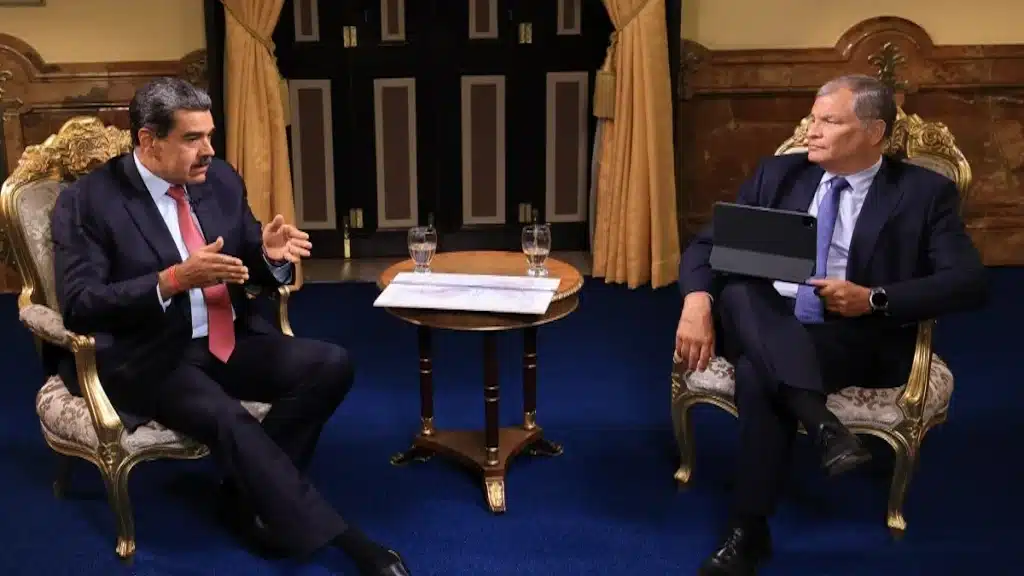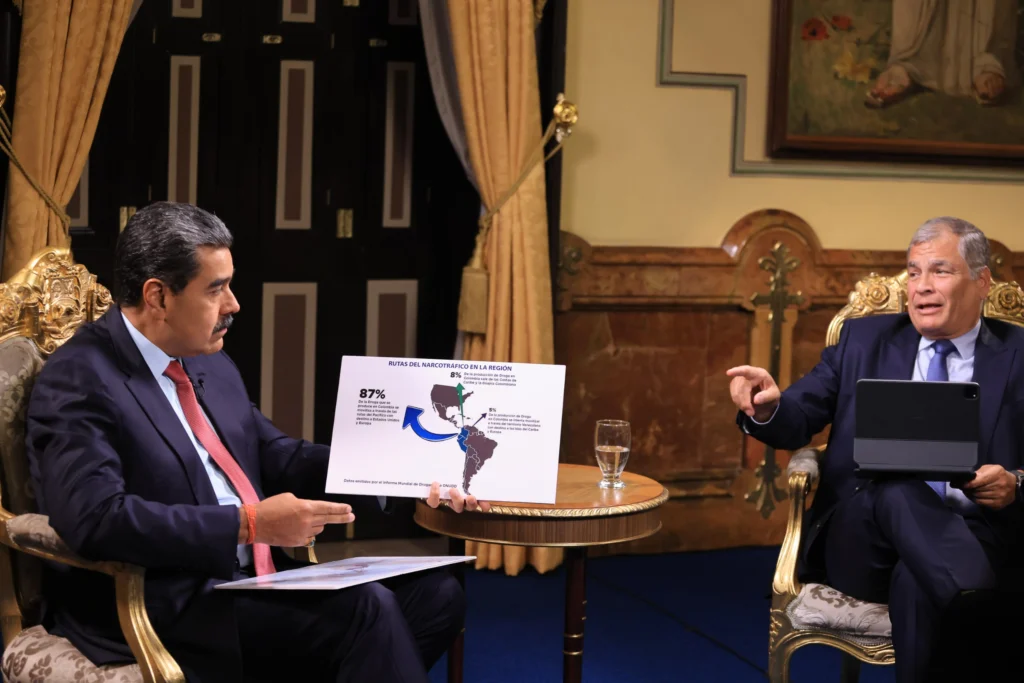
Venezuelan President Nicolás Maduro speaking with former Ecuadorian President Rafael Correa on the program "Conversando con Correa." Photo: Presidential Press.

Orinoco Tribune – News and opinion pieces about Venezuela and beyond
From Venezuela and made by Venezuelan Chavistas

Venezuelan President Nicolás Maduro speaking with former Ecuadorian President Rafael Correa on the program "Conversando con Correa." Photo: Presidential Press.
The Venezuelan president accuses Washington of deploying warships and missiles near the Caribbean to overthrow the government and control the country’s natural resources.
In an interview with former Ecuadorian President Rafael Correa on September 9, broadcast on RT Spanish, Venezuelan President Nicolás Maduro warned of the growing US military presence in Caribbean waters and its potential geopolitical implications. He stated that the presence of eight warships, a nuclear submarine, and more than 1,000 missiles in the region is part of a plan to promote political change in Venezuela.
Tensions between Caracas and Washington increased after threats and subsequent US naval operations in the southern Caribbean, as well as the doubling of the reward for President Maduro’s capture on drug trafficking charges. In response to these measures, the Venezuelan president reiterated his willingness to engage in dialogue, although he rejected “gunboat diplomacy” and warned that, in the event of an attack, Venezuela would adopt an armed defense posture.
The Bolivarian leader maintained that the narrative of combating drug trafficking is being used as a pretext by the Trump administration to intervene militarily in South America. He asserted that the true objectives of the deployment are linked to interest in oil, gas, gold, and other strategic resources. “It’s not about drugs, it’s about our wealth,” he emphasized.
In the conversation, President Maduro rejected accusations about the alleged existence of the so-called Cartel of the Suns and pointed to what he described as a US-based drug trafficking financial structure. Citing data presented by the Venezuelan Vice Presidency, he stated that more than $500 billion linked to drug trafficking circulates through US banks. “All global drug trafficking is directed from there,” he said.
The head of state also criticized Puerto Rico’s stance in this context, after Governor Jenniffer González stated that the Caribbean island would be used as a base for military operations against Venezuela. President Maduro linked this statement to a broader plan of aggression led by the Pentagon, with political support from the local far-right.
The Venezuelan president warned against Washington’s use of media narratives to delegitimize his government. He denounced the US approach as seeking to impose a “Hollywood” narrative that serves as justification for armed intervention, in line with its traditional policy of global domination.
President Maduro also highlighted the consolidation of a multipolar international landscape, with powers such as China, Russia, and India challenging the unipolar order promoted by the United States. He noted that these nations have support in Latin America, Africa, and Asia and expressed his opinion that the world demands peace based on sovereignty, social justice, and national identity.

The president also referred to the Colombian case, which he described as an example of a “drug-trafficking oligarchy” that emerged after decades of direct US influence through Plan Colombia. In his view, this policy not only failed to curb drug trafficking but also consolidated it as a regional phenomenon, even affecting neighboring countries like Ecuador.
Faced with this situation, President Maduro called for the enlistment of citizens in the Bolivarian Militia, which he defined as a national defense strategy against a possible attack. He emphasized that the Venezuelan armed forces are exclusively focused on protecting the territory and not on offensive actions.
(Telesur)
Translation: Orinoco Tribune
OT/JB/SH